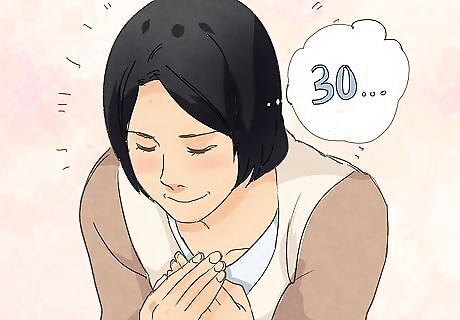
views
Confronting the Reality of Turning 30

Figure out why you are scared of turning 30. Feeling anxiety about aging is completely normal, but your fear might be an unrealistic reaction to an experience or your conceptions of getting old. Identifying why you’re scared of turning 30 may help you more quickly accept this milestone. You might fear turning 30 because some people categorize it as “old.” However, with medical progress and longer life expectancy, thirty is no longer middle age. You might fear turning thirty because it makes you feel like you should accept more responsibility, act like an adult, or because you haven’t achieved everything you thought you would by this age. Consider writing out your aging fears to help you realize that they’re not rational and accept your milestone.

Accept that you’re turning 30. You can’t turn back the proverbial hand of time, so just accept—and welcome-- the fact that you’re turning thirty. Once you let go and recognize the inevitable, you may more easily accept turning 30. Many others people in your life, including your parents and probably some of your friends, have turned 30 and survived. Know you will live through turning 30 and will probably enjoy the decade more than you did your 20s. Take on the attitude that “30 is the new 20.” This behavioral tactic of framing the milestone to minimize its gravity may help you accept it more readily.

Practice yoga and meditation. Consider practicing gentle yoga and meditation to help stretch out your muscles. Doing these exercises can help relax and refocus you, and in turn may help you more readily accept that you’re turning 30. Try doing gentle forms of yoga, such as restorative and yin yoga. These forms are specifically practiced to help stretch out and repair muscles and relax the body. There are many different health benefits to meditation such as lower blood pressure, decreased anxiety and depression, less stress, and greater feelings of relaxation and general well-being. Meditation can also help liberate your mind and allow you to let go of the attachment to things you can’t control. Talk to your doctor before you begin any yoga practice to make sure you’re healthy enough to practice.

Remember that age is just a number. This old truism has likely never been more accurate than today. With advances in health care and lifestyles, people are living longer and looker younger for longer periods of time. Take some time and really think about what you feel turning 30 is "supposed" to look like. Ask yourself where you got those ideas about what you should have accomplished. Then, ask yourself whether you're okay with where you actually are. If not, think about what steps you can take to get to where you think you need to be. If you take care of yourself by exercising, eating healthy, getting plenty of rest, and avoiding stress, your body may be much healthier than that of someone younger than you. Societal pressures in the media often make aging look like a process of aches, feebleness, and inactivity. By keeping in mind Mark Twain’s statement, “age is an issue of mind over matter,” you may be able to not focus on the number of your age but how much you can do and how great you feel.

Think about your accomplishments so far. Your twenties are a defining decade of your life that are filled with making life plans and getting settled. Think about what you’ve accomplished already in your twenties and how that can help set you up for another exciting decade in your thirties where plans may come to fruition. You can consider most major milestones in your twenties as accomplishments. For example, maybe you finished your education or started a family. You can use these accomplishments as starting points for goals during your thirties.

Forget and move on from failures. Accept that there is going to be failure in any endeavor. Learning to embrace the failure and then move on can help you to age gracefully and accept the upcoming challenges of the new decade.

Let go of expectations. The inability to accept turning thirty may begin with expectations you had for yourself. Letting go of unrealistic or unfulfilled expectations can help you create a positive environment and start your thirties out on the right foot. Accept that nothing is perfect. Imperfection adds character and letting go of any expectations of perfection will help you focus on the positive changes in your life.

Avoid comparing yourself to others. Every person is different and comparing yourself to other people can minimize your self-confidence, especially in an era when there is so much societal pressure to appear young. Focusing on yourself and not comparing yourself to others is essential to accepting your upcoming milestone. Don’t let societal conceptions of age or aging discourage you. With so much focus on celebrities who seemingly don’t age—mostly with the help of cosmetic procedures-- it’s hard to accept aging.
Embracing Your 30s

Throw yourself a fantastic party. Start off the decade on the right foot and throw yourself a fabulous party. Ushering in your thirties in a positive way can help you consider all of the wonderful things that may happen in the next decade.

Be confident in what you’ve learned and what you will learn. Have confidence in everything you’ve learned during your twenties and believe that you can apply this knowledge to be successful in your thirties. By cultivating and projecting confidence in yourself, you can set yourself on the path for self acceptance and success during your thirties. Confidence comes from many sources, including knowing that you have a good education and training, good relationships, or even that you look good. For example, if you feel that you took great care of your skin in your 20s, be confidence in the fact that you probably don’t have many wrinkles. You can also be confident if you finished your education or started a good job, or even had healthy children. It’s important to know that even if you are confident and successful, that failure is a part of the equation. Embrace the fact that most people in their thirties feel much more confident and comfortable in themselves, which can help you enjoy yourself and relax.

Make plans and set goals. You likely made plans for yourself in your twenties and you should do the same for your thirties. In many cases, your goals or plans may be extension or the culmination of what you set out to do in your twenties. Having plans and goals can help give you a concrete purpose as you move into this new life phase. Set goals for every aspect of your life: personal, professional, and otherwise. For example, you might want to start a family in your thirties or finally get your PhD. Give yourself short- and long-term goals to achieve and reassess them every year. Make plans to experience as much of life as you can through travel, education, or even just engaging with your community. Getting involved can help you forget your milestone and help you realize that your thirties are much more fulfilling than your twenties.

Enjoy any financial independence. Many people are in stable jobs or stable living situations by the time they are 30. Enjoy any financial independence you’ve achieved by rewarding yourself with travel or buying a home. You don’t necessarily have to make big purchases to enjoy any financial independence you’ve achieved. Even being able to go to a nice restaurant is a way to enjoy having more money than you did when you were in your twenties.

Explore new activities. Trying new activities that interest you or even that someone invites you to join can make your thirties much more exciting. Even if you don’t enjoy it in the end, you will still be more informed and versatile than you were prior to trying the activity. Nurturing your curiosities by allowing yourself to explore the world around you is one of the best ways to embrace your thirties. At this age, you are more likely to truly appreciate activities such as travel and trying different foods and new hobbies. You can try artistic activities such as painting, dancing, or making music; do a new sport or even just take part in a pick up game; or engage in hobbies like photography or a book club. Be open-minded to new trying activities even if they don't seem appealing at first.

Engage in your community or local area. Engaging with your community or the local area, such as through politics, will put you in contact with a wide variety of people and opinions. Exposure to different perspectives and people in your community can show you that getting older isn’t such a daunting process. Consider volunteering at a local hospital or soup kitchen. Realizing that you are healthy and have the means to support yourself can help you further embrace your thirties.

Travel as often as possible. There is an unimaginable amount you can learn from other places, especially foreign countries and cultures. Travel experiences will expose you to different perspectives, histories, and opinions, and in turn can help you embrace your thirties. Travel will show you that the world, even if it’s a nearby town, is multi-faceted and can add new sides to you, too. As you get older and wiser, you’re more able to recognize and appreciate the diversity around you as well as your role in the world. Make sure to get off the beaten path when you travel. Hidden gems may surprise and enrich your experiences. Being more confident in yourself during your thirties can allow you to take these kinds of travel opportunities.

Take care of your health. Taking care of your health is an important part of aging gracefully. Being healthy through exercise and diet can also help you more readily embrace aging and any changes. Eat healthy meals that meet all of your nutritional needs to maintain your health and well-being. For example, you need to make sure you’re getting enough protein, vitamins, and fiber through foods such as lean meats or nuts, and fruits and vegetables. Make sure to allot time for physical activity, such as walking or jogging, for at least thirty minutes a day. You’ll also want to make sure to include time for rest and relaxation, such as reading a book. These will help underscore your healthy eating habits and contribute to your overall well-being. For example, a 3 mile (4.8 km) run will give you time to work out personal or professional problems if you need to while providing your body with needed exercise to maintain your health. In a world where you are easily contacted by cell phones, email, and social media, having unplugged alone time is vital to maintaining your health by minimizing how much input you need to process on a daily basis. For example, you can turn off all electronics at 10pm so that you have an hour or two all to yourself or with your family.

Be thankful for what you have. There are many people who weren’t lucky enough to make it to 30. Be thankful for the fact that you are alive and for everything you have, which may help you counteract any negative thoughts that may arise about turning 30. Make a list of everything for which you’re grateful. In situations where you feel negative, read the list of things for which you’re grateful. This will remind you to stay positive.




















Comments
0 comment